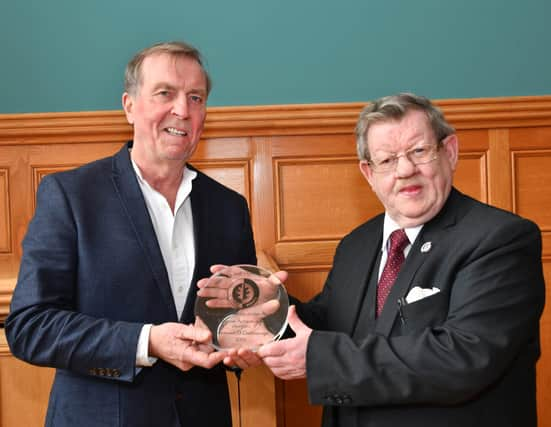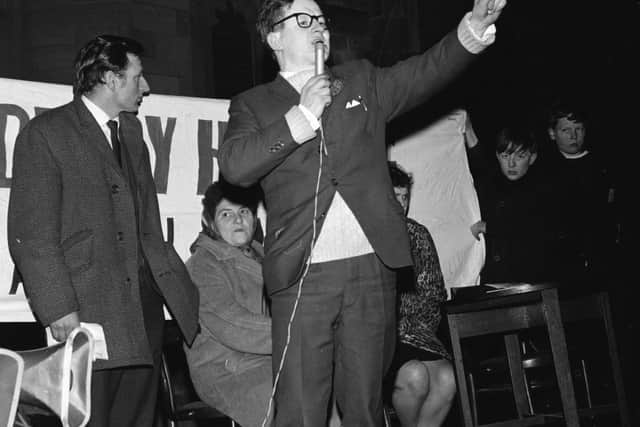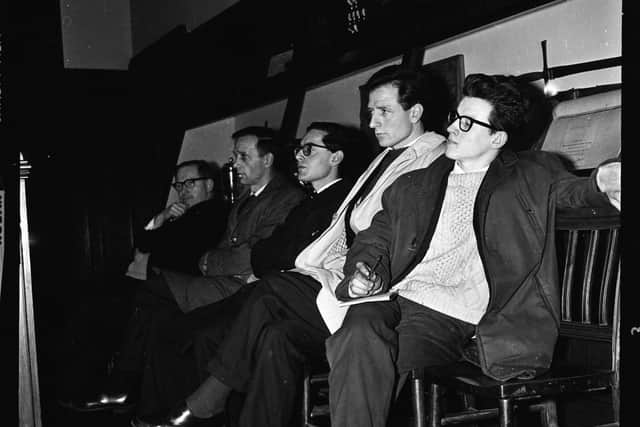A light has gone out with Fionnbarra’s passing... but his was a life well lived


I first met Fionnbarra 57 years ago. At that time, Sinn Fein was banned as a political party in Northern Ireland. In order to get around the ban, groups reformed as republican clubs. Fionnbarra was a founder member of the Derry Young Republican Association.
The group had a bulletin printed every fortnight called “Spearhead”. Fionnbarra was the main contributor to the publication, the editor and the printer. He would have been busy typing and printing in a haze of “Number 6” cigarettes and an overflowing ashtray. The only input he allowed from other members was to turn the handle of the printer.
Advertisement
Hide AdAdvertisement
Hide AdIn the middle of the 1960s, the republican movement recognised that an armed campaign was not the way to move their agenda. The movement made a decision, to address social issues. Fionnbarra adopted this policy whole heartedly.


Fionnbarra was not only a Republican but he was a Republican Socialist. James Connolly was his inspiration. Fionnbarra did not believe that a United Ireland had any value, unless all the people of the nation benefited. Painting the post boxes green and changing the flags, while still having inequality, wasn’t his goal.
From the mid 60s, he was dedicated to working hard to bring about social change. But Fionnbarra was not only concerned about here - he was still campaigning against wrongs worldwide. He was campaigning against what was happening in other places, like Vietnam, while most of the world was silent about it. He was never afraid to swim against the tide if he had a strong belief.
Fionbarra was not a follower but a leader. In Derry, he was a founder member of the Derry Unemployment Action Committee. This group was organised to highlight the obscene level of unemployment in the Derry area due, at that time, to Stormont’s decision to refuse to invest in the North West.
Advertisement
Hide AdAdvertisement
Hide AdTo highlight the situation, they stood and interviewed everyone coming through the doors of the Labour Exchange in order to document their skill level and their availability to work. This document was presented to Brian Faulkner, Minister for Commerce. Brian thanked them and congratulated them on a comprehensive and well documented presentation and, then, promptly filed the report away in a bin somewhere.


Fionnbarra was also a founder member of the Derry Housing Action Group. Again, using whatever means they could, they set out to highlight the extremely poor housing conditions that so many people in this city were living under. This was probably the first instance of open street protests in Derry.
The group blocked a main artery on the Lecky Road with a small caravan that was being lived in by a local family as they had no other option. As part of their housing protests, they occupied the Council Chamber of the Guildhall where Fionnbarra took over the Mayor’s Chair. That protest was eventually ended by the intervention of the RUC.
As another part of the housing protest, Fionnbarra, along with a few other activists, blocked the mayor’s car at the opening of the lower deck of Craigavon Bridge. Fionnbarra and others, including Ruairi O’Carolan - better known as Roddy Carlin - and Neil O’Donnell were prosecuted and given jail sentences for their actions.There was no outcry over the sentencing at the time; they were viewed by large sections of the community, including many in the nationalist community, as left wing activists who were only stirring trouble.
Advertisement
Hide AdAdvertisement
Hide AdAgain, in the mid-60s, Fionnbarra was a founder member of the Northern Ireland Civil Rights Association. In 1967, he co-founded a Derry branch of NICRA. This group failed to act as some members were set against street agitation.
Then, in 1968, with other social activists, mainly from left wing labour and republican backgrounds, he organised a protest march for October 5 from Duke Street to the Diamond. The opposition to the march from Stormont was so strong that they banned the march.
What the NI Government and general public did not know was that banning the march was exactly what Fionnbarra and the other organisers expected and had hoped for. Not to have banned it, and allowed it to go ahead, would have meant the same old crowd would have marched and no one would have paid any heed. NICRA, even, prior to the march, asked for it to be abandoned. History tells the rest.
One of the outcomes of that day was that open brutality ordered by Stormont, and the attention that it achieved, showed the population that street protest could achieve positive outcomes.
Advertisement
Hide AdAdvertisement
Hide AdThat day, many people from differing social and economic backgrounds in the city understood that, by standing together, gains could be achieved.
A week later, the Citizens’ Action Committee was formed, covering a broad spectrum of Derry’s population. It was now not considered extreme to protest. Fionnbarra and the other organisers had done their job well in bringing this about.
During the period of radical street protests, Fionnbarra, with others, was constantly swimming against the tide of public opinion. He and others were called ‘left wing extremists’ and ‘communists’, as a way of undermining their efforts.
However, he and the other activists had showed street protests to be a legitimate process.
Advertisement
Hide AdAdvertisement
Hide AdFionnbarra’s door was always open to anyone who needed support. He was a man who had a massive social commitment, who worked hard for the community he lived in. He was intelligent, compassionate and caring.
In Derry, being described as a ‘character’ is an endearing term for someone who is different. Fionnbarra was different in so many ways.
He had no need or desire to conform.
He did what he thought was right, irrespective of what social norms dictated.
He worked hard all of his life for the community he lived in and, particularly, for those who could not help themselves.
He expected no reward for all that he did.
Advertisement
Hide AdAdvertisement
Hide AdHe held strong views but would allow others who differed to express theirs. He was pragmatic. He knew that all he fought for could not be achieved overnight so was prepared to accept change by degree - he knew to never walk away because the task was difficult and success might take time.
He was trusting to a fault. He was humorous and did not take himself too seriously.
He never turned away a request for help.
He was brave. He had to be as, at that time, acting against the state could result in you being jailed, which it did.
What I am saying here today is only a snapshot of the man we knew.
Advertisement
Hide AdAdvertisement
Hide AdA light has gone out of many of our lives with Fionnbarra’s passing. But many lights have been lit along the way by his life.
Fionnbarra was someone who had a massive social commitment, who worked tirelessly for his community, who was intelligent, compassionate and caring, who gave so much and asked for nothing in return.
Fionnbarra had a habit of calling his friends, ‘Comrade’. We all took this to be a mark of his acceptance of us as true friends.
Can I end by saying: Farewell, Fionnbarra. A life well lived. We were better for having you and proud you were our friend.
Thank you, Comrade.